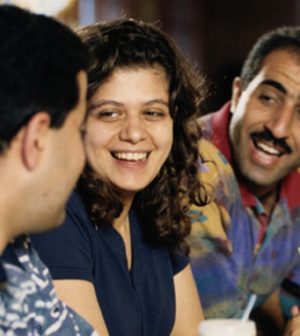- Could Your Grocery Store Meat Be Causing Recurring UTIs?
- Are You Making This Expensive Thermostat Error This Winter?
- Recognizing the Signs of Hypothyroidism
- 10 Strategies to Overcome Insomnia
- Could Artificial Sweeteners Be Aging the Brain Faster?
- Techniques for Soothing Your Nervous System
- Does the Water in Your House Smell Funny? Here’s Why
- Can a Daily Dose of Apple Cider Vinegar Actually Aid Weight Loss?
- 6 Health Beverages That Can Actually Spike Your Blood Sugar
- Treatment Options for Social Anxiety Disorder
No ‘Beer Goggles’: Drinking Doesn’t Make Others Seem More Attractive, Study Finds

Many a person has blamed “beer goggles” following a regrettable one-night stand, but a new study suggests that there’s no such thing.
Rather, alcohol acts more like “liquid courage,” according to findings published in the Journal of Studies on Alcohol and Drugs — you become more likely to approach people you already find attractive, rather than alcohol making others appear more attractive.
“People who drink alcohol may benefit by recognizing that valued social motivations and intentions change when drinking in ways that may be appealing in the short term but possibly harmful in the long term,” lead researcher Molly Bowdring, of the Stanford Prevention Research Center, said in a journal news release.
Conventional wisdom has long held that intoxication makes other people seem better looking, but the phenomenon hasn’t been systematically studied, researchers said.
“The well-known beer goggles effect of alcohol does sometimes appear in the literature but not as consistently as one might expect,” said senior researcher Michael Sayette, director of the University of Pittsburgh’s Alcohol and Smoking Research Laboratory.
Earlier research typically has had participants simply rate other people’s attractiveness based on photos, while sober and while intoxicated.
Bowdring and Sayette’s new study added a more realistic element: the possibility of meeting the people being rated.
The researchers recruited 18 pairs of male friends in their 20s and asked them to rate the attractiveness of people they viewed in photos and videos. Friend pairs were intended to specifically mimic the interactions that would typically take place in a social situation involving alcohol.
The participants were told they might have the chance to interact with one of those people in a future experiment, and after rating for attractiveness, they were asked to pick the people they’d most like to meet.
Pairs of men came into the lab twice – once while they were drinking alcohol, and another when they were given a non-alcoholic beverage.
The researchers did not find evidence of beer goggles. Intoxication played no role in how attractive participants found other people.
However, drinking did affect men’s desire to interact with people they found attractive.
When drinking, they were nearly twice as likely to pick one of their four most-attractive candidates to potentially meet in a future study, compared with when they were sober.
Therefore, alcohol may not be altering perception but rather enhancing confidence in interactions, the researchers concluded.
Drink provides men — and possibly women — the courage to put themselves out there for those they find most attractive, overcoming whatever shyness and reservations they would have when sober, results showed.
More information
American Addiction Centers have more about how alcohol affects inhibitions.
SOURCE: Journal of Studies on Alcohol and Drugs, news release, Aug. 30, 2023
Source: HealthDay
Copyright © 2026 HealthDay. All rights reserved.










